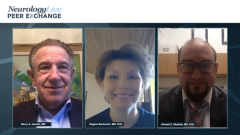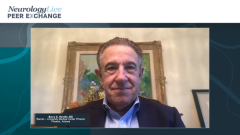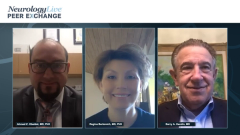
Innate vs Adaptive Immunity in MS Management
Barry A. Hendin, MD, and Regina Berkovich, MD, PhD, provide an overview of the immune system, focusing on innate vs adaptive immunity, in the management of multiple sclerosis.
Episodes in this series

Ahmed Z. Obeidat, MD, PhD: Hello, and welcome to this NeurologyLive® Peer Exchange titled, “Immune Response in the Management of Multiple Sclerosis.” I’m Dr Ahmed Obeidat from the Medical College of Wisconsin in Milwaukee.
Joining me in this discussion are 2 of my dear colleagues. They’re both world-renowned neurologists. We have Dr Barry Hendin, who is the CMO [chief medical officer] of the MSAA [Multiple Sclerosis Association of America]. He’s a clinical professor at the University of Arizona and a director of the Multiple Sclerosis Center of Arizona. Dr Hendin has been a neurologist for over 45 years and is one of our top expert neurologists in multiple sclerosis [MS]. We also have Dr Regina Berkovich. We’re very glad to have you here. Dr Berkovich works in practice in Beverly Hills, California, and she’s a member of the teaching faculty at the University of Southern California. She had lots of experience in academic medicine before transitioning into private practice. She’s highly published and participates in a lot of clinical trials, which is the same for Dr Hendin. We’re excited to have you both here with us in this NeurologyLive® discussion.
We’ll discuss a number of topics pertaining to the immune responses in multiple sclerosis. We’ll start with our first topic, which is an overview of the immune system. For our audience, we’d like to first explain the differences or similarities between the innate and adaptive immune systems. Then we’ll talk about their role in multiple sclerosis and how we think about the immune system in general. Dr Hendin, I’ll start with you. Would you please help us a little with a few words in differentiating innate immunity from adaptive immunity and what that means?
Barry A. Hendin, MD: Sure. In the simplest terms, I think of the innate immune system as being the nonspecific first defense against pathogens. Call that cancer cells, bacteria, viruses, or fungi. This system responds immediately to nonspecific threats whether or not you’ve ever seen them before. It’s fast and effective. The adaptive immune system responds to threats that have been previously experienced. This is a system that has seen viruses, bacteria, cancer cells, or pathogens before, has experience with them, and recruits defenses for those pathogens that have already been experienced once or more in the past.
Ahmed Z. Obeidat, MD, PhD: That’s great. Thank you very much. This summarized the major differences here. Dr Berkovich, within the adaptive immune system, we have what we call cellular responses and humoral responses. Can you please comment on these 2 and the differences between them?
Regina Berkovich, MD, PhD: Thank you. I’d like to start by providing my own additional comment to the differentiation between the innate and acquired immune system. Another name for adaptive is acquired. Innate is the one that humans are born with. For the innate immune system, the human body doesn’t have to have any previous experience. That’s something that everyone has when they’re born. An adaptive, or acquired, immune system is the one that person acquires with their life in the environment. In the environment, we’re surrounded by different pathogens, and it’s more specific to individual pathogens and therefore a more sophisticated level of the immune system.
What you’re asking me specifically on the differentiation within the acquired immune system is the cellular and humoral response. It’s worth mentioning that with whatever type of immune system we’re discussing, we have to understand that like in a multiclass society, these different classes interact with each other even if the society is very stratified, like in certain developing countries. Nevertheless, those classes do interact.
If you look at the more democratic societies, the interaction is even more intense. Think about our body’s immune system as a democratic society where the classes interact very actively. Just like the innate immune system interacts very heavily with the acquired or adaptive immune system, in the same way, within the adaptive immune system, T-cell response and B-modulated immune response are also extremely interwoven and create the mutual fabric. You can’t separate one from the other. Therefore, it’s important to remember that the B-cell signaling immunoglobulins are important for the cellular response. At the same time, cellular response is extremely important for the B regulatory function as well.
We learned about the immune system in MS with the discovery of the new pharmaceutical medications. We learned so much about how the immune system intricately works with the arrival of the new medications and our clinical observations on how those medications evolve. For example, we learned a great deal after the approval of alemtuzumab. It showed us that B cells require the regulatory function of the T cells, and that’s the way to protect us from autoimmune complications.
We learned a lot after the approval of the B-cell depletion medications because we learned about the importance of B cells for humans in the long run. In the same way, we learned a lot from the approval of cladribine because it shows huge differences compared with the previous 2 classes I just mentioned. It showed that with this medication, we may have somewhat better safety for good reasons because there might be a more sophisticated approach to the interaction between the T and B systems.
Moving back to the question, the T cell-mediated response is mediated through the behavior of the cells and the interaction between them through the biochemicals called cytokines. The B lymphocytes, which later convert into plasma cells, are located in the tissues and produce immunoglobulins. That’s their way of communication. Antibodies, immunoglobulins, are being produced by the plasma cells, but plasma cells don’t develop out of nowhere, they come from the B lymphocytes.
Ahmed Z. Obeidat, MD, PhD: Thank you very much for this detailed and astute explanation. You touched on the fact that the immune system works as a unit, so it’s more like an orchestra. They work together. It’s in harmony. This is very important as we talk about it because the immune system is very smart. Even if you’re affecting part of it, it’s still able to compensate for the loss of some of the cells at certain stages for certain periods of time.
Transcript Edited for Clarity
Newsletter
Keep your finger on the pulse of neurology—subscribe to NeurologyLive for expert interviews, new data, and breakthrough treatment updates.














